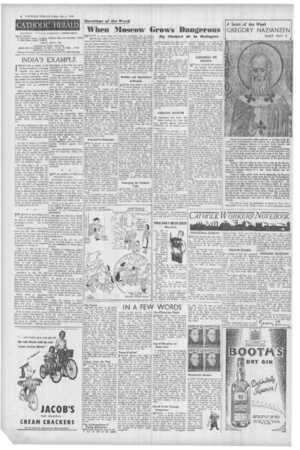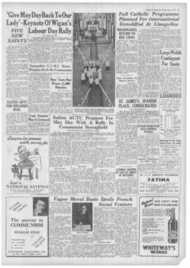Page 4, 6th May 1949
Page 4

Report an error
Noticed an error on this page?If you've noticed an error in this article please click here to report it.
Tags
Share
Related articles
Cat Hol Ic Wo R Kers' Note Book
Cat Hole Wo R Kers' Notebook
Case Against Sunday Trading
Ati-7 -- Rx Wo R Kers' Notebook
C At Holic Wo R Kers' Notebook
CATHOLIC WO R KERS' NOTEBOOK
INDUSTRIAL SUNDAY
TH"year Labour Day and Indus
trial Sunday tell on the same day and the one surprising thing about it all was the lack of Lathone demonstrations in the South of Engiand.
It is true that the Catholic Social Guild and ACTU are hoiddig various rallies throughout the rest of May in commemoration ot the Encyclical iteram Alovaram in many Southern towns, but it seems a pity that such an opportunity to demonstrate our faith as workers was missed.
Another point too, is that in many non-Catholic churches Industrial Sunday gave extra colour and meaning to Labour Day. In a book of speeches by Canon Joseph Cardijn, entitled The Church and the Young Worker, one finds a passage: "Without work there is no Host, not a single drop of wine to consecrate, no altar stone, no vestments, no Church. Without work there is no religion."
'I hese may be powerful words, but Cardijn has discovered nothing new, he is simply reminding us of
age-old truths. It is right that we proclaim our religion in a n d through our work. It is also right and just that we apply the teachings of the Church in our dealings with our fellow workers no matter who or what they are.
HIGHER WAGES
IN noticing the fact that members
have authorised the National Union of Ranwaymen to seek a wage increase of 10s. a week— which is 2s. 6d. less than the recently rejected claim—a correspondent writes to say that 65,00U out of a total of 500,000 railwaymen get £4 I2s. 6d., basic wage. less stoppages.
have often said that there are many workers today getting far less money than the stanuard of living requires. It seems a fair claim for such lowly-paid railway workers, and for workers in other industries too, many of whom are paid about the same amount.
I have had letters from people who complain that if higher wages are paid to dockers, busmen, railway workers and the like, prices and costs of travel will go up. Surely that is no argument?
I meet many people, who are just existing on their salaries—ordinary workers exploited by landlords and landladies whose wages are eaten up by paying high rents. Families in one or two rooms, living like cattle. These are the things that count.
Unless something is done in this direction. no one can blame workers for wanting more. On a high I economic level, Sir Stafford Cripps I is right when he says we cannot afford luxuries, but the ordinary person only wants the right to live and bring up his family in decent surroundings, with enough food and clothing, and enough for an annual holiday.
DOCKERS' SOLUTION
IT is good to see that six dockers
from the Surrey Docks have worked out a pensions plan to avoid further unrest at the docks over dismissals of ineffective workers. The details are on another page.
The last unofficial strike was primarily caused through the dissatisfaction of dockers, at being thrown on the scrap heap without any security after many years of service. The suggested scheme, it is stressed, is only a stop gap effort until the unions and the Port Authorities work out something permanent_ It is often said that the solution to the problems of the workers will come from the workers themselves —here is an example of that coming into practice. The answer is to get to know as much about one's trade as is possible, and then working through the trade union branch contribute towards the betterment of conditions, through knowledge and experience.
That is why it is important to take advantage of the educational fa,ilities that are offer-1 these days.
blog comments powered by Disqus









